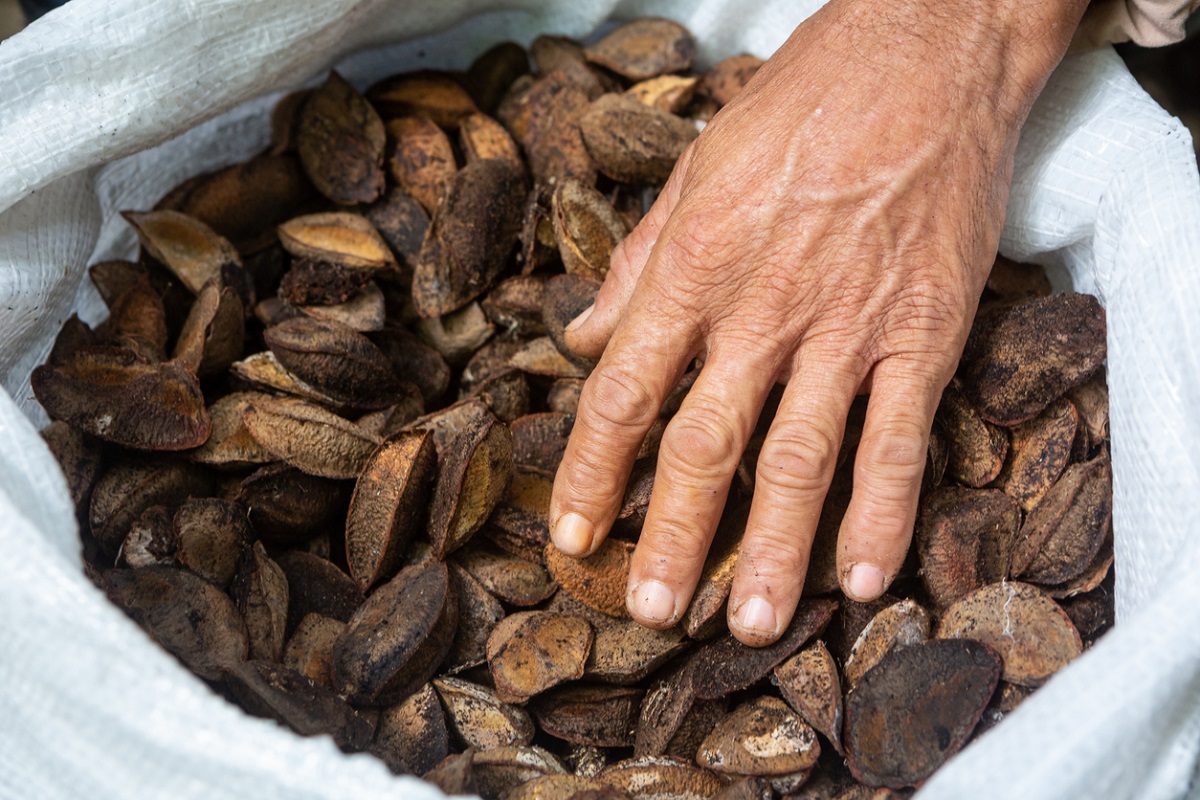
Brazil Nut Genome Sequenced to Enhance Breeding of Tree Species
March 16, 2022| |
An inter-agency team of Brazilian scientists took the initiative to sequence the genome of the Brazil nut tree to identify genes responsible for important traits like drought tolerance, pathogen-resistance, and reproductive compatibility in the hopes of preserving this Amazon icon.
This is the first time that a reference genome was created for the Brazil nut tree, with data coming from 30 Brazil nut tree populations found throughout the Brazilian Amazon region. Aside from identifying genes of desirable traits, scientists also aim to understand the influence of the environment in the structuring of the tree's genetic variability.
The sequence revealed the presence of genes of reproductive incompatibility making it easier to identify which individuals cannot breed with each other. This helps breeders in the selection of female individuals to be used in breeding programs. It also identified genes related to selenium metabolism, and pest- and disease-resistance. Lastly, the sequence exposed each plant genome's evolutionary history and from which region it has adapted to, which is crucial when developing conversation strategies and breeding programs for fruit production designed for the Brazil nut tree.
The genome sequence will significantly accelerate the breeding and genetic improvement of the species, as it usually takes 50 to 200 years to assess its full cycle and gather the needed data. The reference genome helps scientists shorten the path to the selection of superior plants and fast-track the recommendation of genetic material for commercial cropping.
The project was implemented through a collaboration among the Brazilian Agricultural Research Corporation (Embrapa), the Federal University of São Carlos, and the University of Brasilia with support from the São Paulo State Research Support Foundation. Learn more about the project by reading the news release from Embrapa.
| |
You might also like:
- Genome Reveals How Almonds Went from Deadly to Delicious
- Scientists Sequence Walnut Genome
- Endangered Plant Species Becomes Model for Genome Sequencing
Biotech Updates is a weekly newsletter of ISAAA, a not-for-profit organization. It is distributed for free to over 22,000 subscribers worldwide to inform them about the key developments in biosciences, especially in biotechnology. Your support will help us in our mission to feed the world with knowledge. You can help by donating as little as $10.
-
See more articles:
-
News from Around the World
- FAO DG Tackles Food Security Impact of Russia-Ukraine Conflict, Presents Policy Recommendations
- DSI Scientific Network Calls Support for Equitable and Open Policy Solutions for DSI
- Massive Genomic Project to Benefit African Biodiversity, Science Community
- US EPA Approves Oxitec's Mosquito Pilot Projects in California and Florida
- USDA APHIS Deregulates Plant-Parasitic, Nematode-Protected, and Herbicide Tolerant GM Soybean
- Friendly™ Fall Armyworm Reduces FAW Populations on Commercial Bt Corn Farms in Brazil
- EFSA Releases Scientific Opinion on Four-Event Stack GM Maize
-
Research Highlights
- International Research Team Sequences Bread Wheat Genome; Finds Gene for Stripe Rust Resistance
- Oligonucleotide-based Method Offers Precise Control Over Weeds
- Brazil Nut Genome Sequenced to Enhance Breeding of Tree Species
-
Plant
- Kenya Publishes Genome Editing Regulations Becoming Second African Country To Do So
- FDA Clears Marketing of Genome-Edited Beef Cattle
-
Read the latest: - Biotech Updates (February 18, 2026)
- Gene Editing Supplement (January 28, 2026)
- Gene Drive Supplement (February 22, 2023)
-
Subscribe to BU: - Share
- Tweet

